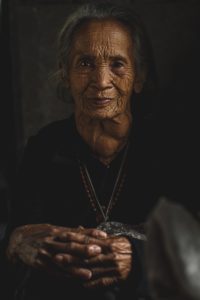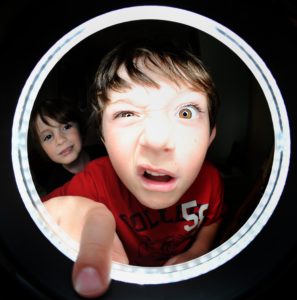In the old tales, young women are sent on dangerous quests that involve learning to sort one thing from another. One such teacher is Baba Yaga, about whom I’ve written previously. Baba Yaga is a crone, and when she can be bothered, she teaches too-sweet maidens how to sort poppy seeds from dirt, how to cleanse, and how to cook.

This is to be understood metaphorically, rather than as a statement of appropriate gender roles. Take a deep breath, all you feminists!
The idea of discernment, or the ability to tell one thing from another, is essential to living effectively, and, much like restraint, we are losing touch with it in today’s world.
Sorting poppy seeds from dirt, or wheat from chaff, or mildewed kernels from wholesome corn, is not something technology can help us do. It doesn’t require equipment, money, strength, or a college education.
It’s a hopeless task, of course, to sort poppy seeds from a pile of dirt in one night with no light and no help, but in stories it’s a task that must be done if the maiden wants to live. Usually a magical animal or some other helper arrives; symbols of the maiden’s intuition, kindness or compassion. Interestingly, the maiden often sleeps while the helper(s) accomplish the task.
Metaphorically, this indicates that our civilized, rational, logical intellect must step out of the way and allow creativity, faith and intuition to guide us. Fairytales and oral tradition map our subconscious, our shadow, our deepest and oldest foundations, the places where our primal wisdom lies. Sorting one thing from another takes time and close examination. Discernment involves our senses and our feelings as well as our intellect. It demands our consent to peer closely, and accept what we see. It can’t be done in the presence of denial. Fear clouds discernment, as do distraction, an unwillingness to be wrong, ideology, and an inability to think critically. Gaslighting, projection, distortion and deflection all work actively against our ability to see things clearly. Those who are unwilling to venture into terra incognita are unable to practice discernment, which involves learning and adaptation.
Modern life doesn’t require us to sort poppy seeds from dirt, but here are some places in which discernment is vital:
- Differentiating between truth and lies
- Distinguishing between friends and not-friends
- Recognizing the difference between power-with and power-over
- Realizing the difference between our beliefs and needs and those of others
- Differentiating between love and abuse, or love and control
- Distinguishing between kindness and enabling
- Realizing the difference between useless and useful
- Knowing the difference between what makes life easier and what makes it harder (simplicity and complication)
- Distinguishing between poisoned bait or toxic mimics and healthy choices
- Understanding where our power is and where it is not
- Noticing differences between words and actions (major red flag)
- Differentiating between our own ghosts, struggles and wounds and those of others; in other words, do we take it all personally or blame it all on others?
- Knowing the difference between our authentic selves and our pseudo selves
- Recognizing the difference between what truly makes us happy and what the culture insists should make us happy
Discernment is not prejudice, hate or bigotry. The ability to tell one thing from another is a basic skill. I remember watching Sesame Street in the 60s when I was a child: “One of these things is not like the others. One of these things doesn’t belong.“

In this era of “alternative facts” and postmodernism, our ability to discern is taking a beating, and those of us who persist in attempting to clearly see and understand our world, ourselves, and others are often targeted on social media. Interesting, that a skill four and five-year-olds can learn is becoming demonized.
© 2020 – 2022, Jenny Rose. All rights reserved.